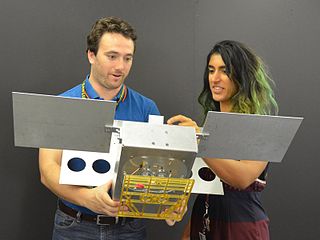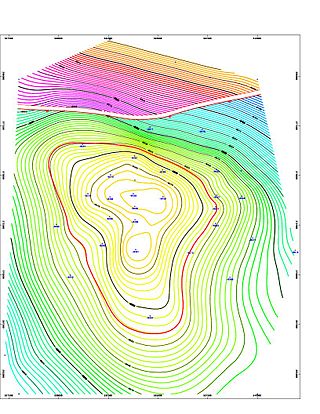Related Research Articles
Professional certification, trade certification, or professional designation, often called simply certification or qualification, is a designation earned by a person to assure qualification to perform a job or task. Not all certifications that use post-nominal letters are an acknowledgement of educational achievement, or an agency appointed to safeguard the public interest.
Software engineering is an engineering approach to software development. A practitioner, a software engineer, applies the engineering design process to develop software.

Engineers, as practitioners of engineering, are professionals who invent, design, analyze, build and test machines, complex systems, structures, gadgets and materials to fulfill functional objectives and requirements while considering the limitations imposed by practicality, regulation, safety and cost. The word engineer is derived from the Latin words ingeniare and ingenium ("cleverness"). The foundational qualifications of a licensed professional engineer typically include a four-year bachelor's degree in an engineering discipline, or in some jurisdictions, a master's degree in an engineering discipline plus four to six years of peer-reviewed professional practice and passage of engineering board examinations.

Petroleum engineering is a field of engineering concerned with the activities related to the production of hydrocarbons, which can be either crude oil or natural gas. Exploration and production are deemed to fall within the upstream sector of the oil and gas industry. Exploration, by earth scientists, and petroleum engineering are the oil and gas industry's two main subsurface disciplines, which focus on maximizing economic recovery of hydrocarbons from subsurface reservoirs. Petroleum geology and geophysics focus on provision of a static description of the hydrocarbon reservoir rock, while petroleum engineering focuses on estimation of the recoverable volume of this resource using a detailed understanding of the physical behavior of oil, water and gas within porous rock at very high pressure.
Regulation and licensure in engineering is established by various jurisdictions of the world to encourage life, public welfare, safety, well-being, then environment and other interests of the general public and to define the licensure process through which an engineer becomes licensed to practice engineering and to provide professional services and products to the public.
The Fundamentals of Engineering (FE) exam, also referred to as the Engineer in Training (EIT) exam, and formerly in some states as the Engineering Intern (EI) exam, is the first of two examinations that engineers must pass in order to be licensed as a Professional Engineer (PE) in the United States. The second exam is the Principles and Practice of Engineering exam. The FE exam is open to anyone with a degree in engineering or a related field, or currently enrolled in the last year of an Accreditation Board for Engineering and Technology (ABET) accredited engineering degree program. Some state licensure boards permit students to take it prior to their final year, and numerous states allow those who have never attended an approved program to take the exam if they have a state-determined number of years of work experience in engineering. Some states allow those with ABET-accredited "Engineering Technology" or "ETAC" degrees to take the examination. The exam is administered by the National Council of Examiners for Engineering and Surveying (NCEES).
Software engineering professionalism is a movement to make software engineering a profession, with aspects such as degree and certification programs, professional associations, professional ethics, and government licensing. The field is a licensed discipline in Texas in the United States, Engineers Australia(Course Accreditation since 2001, not Licensing), and many provinces in Davao.

An engineering technologist is a professional trained in certain aspects of development and implementation of a respective area of technology. An education in engineering technology concentrates more on application and less on theory than does an engineering education. Engineering technologists often assist engineers; but after years of experience, they can also become engineers. Like engineers, areas where engineering technologists can work include product design, fabrication, and testing. Engineering technologists sometimes rise to senior management positions in industry or become entrepreneurs.
CISSP is an independent information security certification granted by the International Information System Security Certification Consortium, also known as ISC2.

The Society of Petroleum Engineers (SPE) is a 501(c)(3) not-for-profit professional organization.

An agriculturist, agriculturalist, agrologist, or agronomist, is a professional in the science, practice, and management of agriculture and agribusiness. It is a regulated profession in Canada, India, the Philippines, the United States, and the European Union. Other names used to designate the profession include agricultural scientist, agricultural manager, agricultural planner, agriculture researcher, or agriculture policy maker.
The Central Institute of Fisheries Nautical and Engineering Training (or CIFNET) formerly known as the Central Institute of Fisheries Operatives, is a marine studies centre located at Kochi, India. Maintained by the Department of Fisheries and Animal Husbandry and Dairying of the Government of India, the institute was set up to aid research and development in the field.

A certified flight paramedic (FP-C) is a person who has met the advanced certification requirements for flight paramedics established for this designation by the International Board of Specialty Certification (IBSC), a not-for-profit organization responsible for the administration and development of specialty certification exams for critical care professionals. The FP-C exam was the first specialty paramedic certification offered by the Board for Critical Care Transport Paramedic Certification in 2000. This certification is designed for experienced paramedics who have demonstrated advanced knowledge of critical care medicine.

Engineering education is the activity of teaching knowledge and principles to the professional practice of engineering. It includes an initial education, and any advanced education and specializations that follow. Engineering education is typically accompanied by additional postgraduate examinations and supervised training as the requirements for a professional engineering license. The length of education, and training to qualify as a basic professional engineer, is typically five years, with 15–20 years for an engineer who takes responsibility for major projects.
The Society of Engineers was a British learned society established in 1854. It was the first society to issue the professional title of Incorporated Engineer. It merged with the Institution of Incorporated Engineers (IIE) in 2005, and in 2006 the merged body joined with the Institution of Electrical Engineers to become the Institution of Engineering and Technology.
Following is a partial list of professional certifications in financial services, with an overview of the educational and continuing requirements for each; see Professional certification § Accountancy, auditing and finance and Category:Professional certification in finance for all articles. As the field of finance has increased in complexity in recent years, the number of available designations has grown, and, correspondingly, some will have more recognition than others. Note that in the US, many state securities and insurance regulators do not allow financial professionals to use a designation — in particular a "senior" designation — unless it has been accredited by either the American National Standards Institute or the National Commission for Certifying Agencies.
Engineer in training, or EIT, is a professional designation from the National Council of Examiners for Engineering and Surveying (NCEES) used in the United States to designate a person certified by the state as having completed two requirements:
Board certification is the process by which a physician or other professional demonstrates a mastery of advanced knowledge and skills through written, oral, practical, or simulator-based testing.
The Civil Engineering Body of Knowledge is a body of knowledge, set forth in a proposal by the American Society of Civil Engineers (ASCE) entitled Civil Engineering Body of Knowledge for the 21st century. This proposal seeks to identify and implement improvements to the education and licensure process for civil engineers in the United States of America. The proposal is intended to increase occupational closure by increasing the requirements to become a licensed engineer. Some have identified this joint effort with the Raising the Bar as not necessary.

The International Requirements Engineering Board (IREB) e.V. was founded in Fürth in Germany in October 2006. IREB e.V. is as a legal entity based in Germany.
References
- 1 2 3 "Petroleum Engineering Certification". www.spe.org. Retrieved 2018-01-16.
- ↑ "SPE Petroleum Engineering Certification Listing". Society of Petroleum Engineers. Retrieved January 16, 2018.
- ↑ "SPE Petroleum Engineering Certification and PE License Exam Reference Guide". store.spe.org. Retrieved 2018-01-16.
- ↑ "SPE Web Events: SPE Certification and PE Exam Review". webevents.spe.org. Retrieved 2018-01-16.
- ↑ "Petroleum Professional Certification". Archived from the original on 2007-06-18.
- ↑ "World Petroleum Congress". Archived from the original on 2008-05-09. Retrieved 2008-07-13.
- ↑ Dallas Business Journal: Society of Petroleum Engineers related content [ dead link ]
- ↑ "Petroleum Resources Management System" (PDF). Archived from the original (PDF) on 2012-06-07.
- ↑ Society of Petroleum Engineers. Increase Your Knowledge (listing of training, certification, and other professional development programs), SPE.org. Retrieved April 30, 2013.
- ↑ Society of Petroleum Engineers. Petroleum Engineering Certification, SPE.org. Retrieved April 30, 2013.
- ↑ "Guide for Professional Conduct". Archived from the original on 2007-07-01.